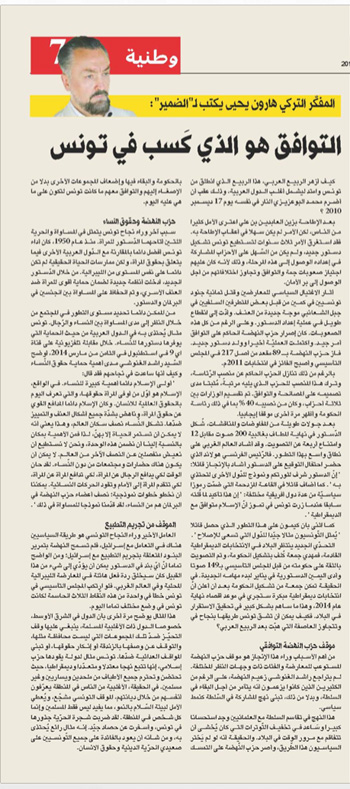.png) So how did Arab Spring, which swept across the Arab world, affect the very country that started it when the street vendor Mohammed Bouazizi set himself on fire on December 17, 2010?
So how did Arab Spring, which swept across the Arab world, affect the very country that started it when the street vendor Mohammed Bouazizi set himself on fire on December 17, 2010?
Even though the ouster of Zine El Abidine ben Ali brought hope to many, the aftermath was nowhere near as easy. For instance, it took three years for Tunisia to get a new constitution and it certainly wasn't easy for the parties involved to reach that stage, as they had to overcome numerous difficulties, and reconcile their differences in order to reach a compromise.
Political assassination of dissidents and the murder of eight Tunisian soldiers ambushed by some Salafi radicals on Mount Chaambi triggered a fresh wave of violence and led to a long interruption in the constitutional preparation process and also caused a sharp polarization in the country. Despite all these troubles, the persistence of the ruling An-Nahda party to reconcile fared well, and the process was finally completed. An-Nahda won 89 out of 217 seats in the parliament, getting 41% of the votes and became the winner in the 2011 elections.
Despite this, the party waived the position of president, and left that title to the second-place party, proving one more time how determined they were to reach a compromise. They had the same approach with regards to the ministries and settled with only 40% of the ministries, except for the Prime Ministry, and displayed once again a very positive attitude.
The Tunisian army’s decision to stay out of politics, as a part of the country’s tradition, also helped progress the constitution-drafting process. After Ben Ali was toppled, the Tunisian army refrained from fighting the people of the country, and instead kept its distance from politics; even today, the army isn’t seen as political.

After long rounds of negotiations and discussions, the constitution was finally promulgated with a majority of 200 votes for, twelve against and four abstentions. The development was widely lauded by the Western world; French President Hollande, who attended the ceremony, hailed the achievement: "The constitution honors your revolution and is an example for other countries to follow," he told the crowded chamber which included important political figures from various African countries. "It confirms what I had said [when I visited] in July, that Islam is compatible with democracy."
Ban Ki Moon also weighed in on the subject, saying, "Tunisians serve as a good example to other people that wish for reform".
The new challenge awaiting the country is the upcoming democratic elections. Mahdi Jomaa, who was assigned the duty of forming the government, received his confidence vote from the Parliament with 149 votes for and was sworn in on January 30th to start his new duties. The fact that Jomaa managed to build a government, after he announced that early democratic elections would be held at the latest in 2014, also greatly contributed to the stability in the country.
So how can Tunisia be so successful in weathering the storm that naturally comes after the Arab Spring?
The accommodating attitude of the An-Nahda Party
One of the most important reasons behind this achievement is the accommodating attitude of the An-Nahda Party towards the opposition and towards groups with views different than theirs. Rashid Al-Ghannushi, the leader of An-Nahda, didn't back down even though many claimed that he was compromising for the sake of holding on to his post. Instead, he adopted sharing power as a political style.
This agreeable approach of sharing power with secular groups helped ease the tensions that threatened to rise from time to time in the country: If they hadn’t chosen this path, in other words, if An-Nahda tried to abuse its power and weaken other groups and not heed them, Tunisia wouldn't be where it is now.
An-Nahda and Women’s Rights
Another reason behind Tunisia's success is the equality and freedom offered to women in the constitution. Since the 1950s, Tunisia has always fared better compared to other Arabian countries with respect to women's rights, yet real life practices didn't always reflect the same level of liberalism. With the new constitution, new regulations were introduced to ensure a stronger protection of women from domestic violence, and gender equality in the parliament was safeguarded with the constitution.
It is always possible to determine the development level of a society by looking at how equal the women and men are treated. Tunisia is leading the way for other Arab countries in terms of the protection its constitution offers to women. During an interview with A9 TV in Istanbul on March 8th, 2014, Mr. Rashid al-Ghannushi explained how important it was for them to protect the rights of women and how this helped their success:

“Islam always attaches great importance to women. Indeed, it is Islam that first gave women their rights, which are now universally recognized as international human rights. Islam has always been a fervent defender of women’s rights and is also vehemently against all forms of violence and discrimination against women. Women make up half the population of the world; it means that life can exist only with them. So it is crucial for us to ensure this unity, as we cannot live separated from the other half of the world. There can be no civilizations, societies, or communities without women. It is now high time that men speak up for women, that women speak up for women, that women come forward and to have women's movements. We can make exemplary moves; half of the An-Nahda members in the Parliament are women. We have presented a model for equality.“
An-Nahda and normalizing relations with Israel
The final factor behind the Tunisian success is their approach to Israel. An-Nahda didn't tolerate the various attempts to make enjoying normal relations with Israel a crime; quite obviously, any provision in the constitution that could amount to something like that would create an immense backlash in domestic liberal opposition and in the Western world.
If the Constituent Assembly of Tunisia, which drew up the constitution, made a mistake in any one of these three crucial points, Tunisia would be in a very different place today.
This example makes it very clear yet again that countries in the Middle East, especially those with Muslim majority, should put aside their attitude of isolating and alienating groups that are not as conservative as them, labeling them heretics, denying them their rights or adopting a violent attitude towards them. Tunisia is one example where even though the leading party is religious, they follow a moderate, pluralistic, and democratic approach that respects and embraces atheists, leftists, women, non-Muslims and everyone else. Since it is a fact that the majority of the people in the region identify themselves with religion, Tunisia’s attitude is refreshing, giving hope that a peaceful environment may arise which not only benefits Muslims but everyone in the region. The tree of liberty has taken root in Tunisia and yielded a fine harvest. It is a great example to be followed that will benefit all Tunisians both in terms of religious freedom and human rights.
Adnan Oktar's piece on Dhamir & Muslim Mirror:
http://muslimmirror.com/eng/reconciliation-is-the-winner-in-tunisia/


